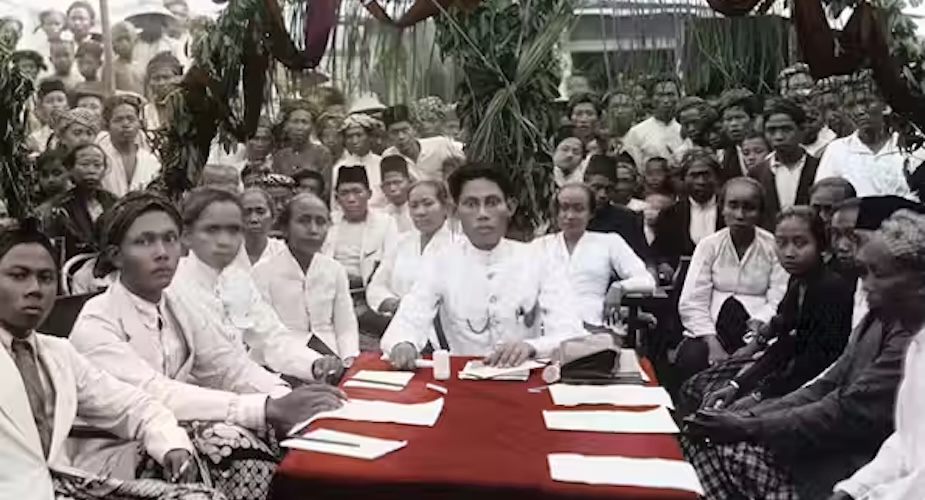The dreadful silence of an outspoken poet
Wiji Thukul wrestled with the daily realities of poverty and violence. During the late New Order he was acknowledged as one of Indonesia's best poets, and he remains a standard bearer for radical grass roots democratic change. His celebrated catch cry, Hanya satu kata: Lawan!Peringatan (Warning, 1986). Striking workers and protesting students still use it. It seems incongruous that till recently little was done to investigate the mysterious disappearance two years ago of this important contributor to Indonesia's democratic movement. (There's only one word: Resist!) is taken from his poem.
Living in Solo, Central Java, Wiji Thukul always identified first as a poor urban kampung resident who faced the same struggles as his neighbours: factory workers, street hawkers and scavengers. The son of a pedicab driver and with limited formal education, he worked as a day labourer before assisting his wife, Sipon, a tailor, working from home. They have a daughter, Wani, and a small son, Fajar Merah. When I first met them in 1993 they were subsisting on about AU$2 per day.
Through the irony of bewilderment, Wiji Thukul's poem, An odd puzzle (1993, see box), articulates the frustration of working class families who struggle to obtain the most basic necessities. They work long hours, producing a myriad of products, most of which they can never afford. The poem evolved from an evening conversation at a roadside stall.
Wiji Thukul's searing commitment to real change was not only uncomfortable for Suharto's New Order. The pro-democratic pretensions of many 'progressive' intelligentsia did not escape his sting. His larrikinism at an all-Java poets' convention held in Solo in 1993 shattered the sombre atmosphere of their aloof readings on human rights. He engaged his enthusiastic audience with 'Displacing the clever people' (1993 - see language insert elsewhere in this edition). Thukul was wary of many 'cultural activists', students or NGOs who, despite much rhetoric, were unwilling to engage with the marginalised.
I remember a hilarious skit performed under Thukul's guidance by a group of local children to celebrate Independence Day in 1993. The children pretended to wash themselves in the public bath. They could never quite finish before someone pressed a buzzer informing them their time was up. Through play, music and theatre these children became critical observers of the social reality shaping their lives. Their parents were jailed for drinking, gambling or fighting, they were exploited as child labourers, a nearby dye factory dirtied their water, their homes were always flooding, they queued daily for the public amenities.
Thukul, and a few who dared to associate with him, were under continual surveillance. In December 1995 he almost lost an eye after he was bashed while security forces broke up a large protest he helped organise with local textile workers.
Around 1993-4 Thukul became affiliated with the PRD, a radical left-wing political party outlawed by the Suharto regime. Thukul headed the PRD's Peoples Art Network (Jakker). After the 27 July 1996 riot following the military-backed invasion of the PDI headquarters in Jakarta, the PRD were made scapegoats. Thukul went into hiding, as did other PRD leaders. Sipon and children met secretly with Thukul in December 1997, then lost contact with him. He was in contact with some of his friends up until April 1998.
When I met Sipon again in February this year, she recounted that for about two years after Thukul vanished she lived a sleepless nightmare of not knowing his fate. Her family was constantly harassed. She secretly burnt many reference materials critical of the New Order, and buried some of Thukul's more important writings, before security personnel entered the house and stole what was left. The family was isolated and the children's workshop disbanded as neighbours stayed away. Sipon lived in constant fear that her children might be kidnapped to draw Thukul out.
Though still deeply traumatised, Sipon has worked on courageously. She recently paid off a loan for a second, better sewing machine. Slowly winning back her neighbours, she has also recommenced the children's workshop.
There have been several unconfirmed sightings of Thukul over the last two years in Jakarta, Kalimantan and East Java. It is doubtful he ever left Indonesia. But it is difficult to understand why he should remain in hiding. PRD leader Budiman Sudjatmiko has said he fears Thukul became the victim of a government purge.
Sipon recently registered Thukul with Kontras, the Commission for Missing People and Victims of Violent Acts. Her determination attracted media attention. Two Yogyakarta groups, Taring Padi and FKRY, organised readings of his poetry and started a petition. They want Thukul's case raised as part of a full investigation into the 27 July incident.
Richard Curtis (curtisr@spectrum.curtin.edu.au) teaches at Curtin University in Perth, Australia. More information on Thukul is in his PhD thesis 'People, poets, puppets' (Curtin University, 1997). Readers who know of Wiji Thukul's whereabouts should contact Richard.











